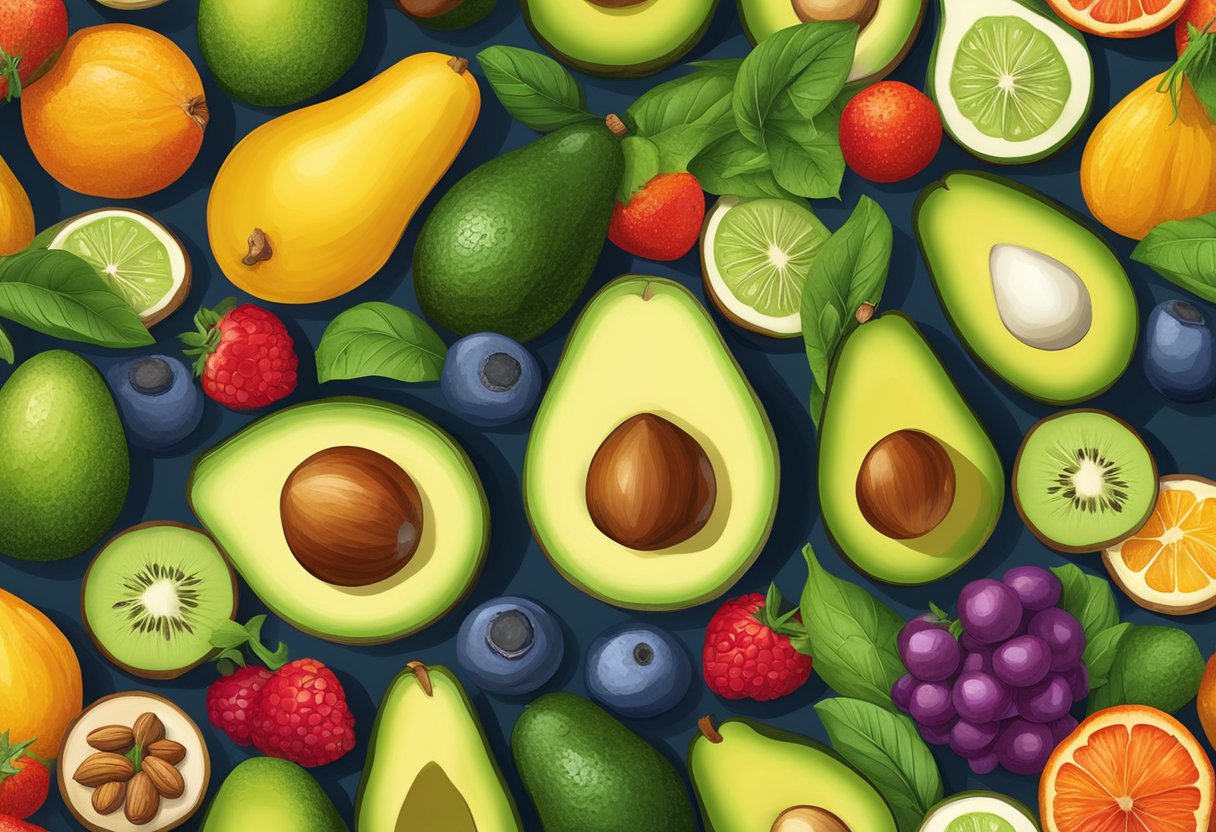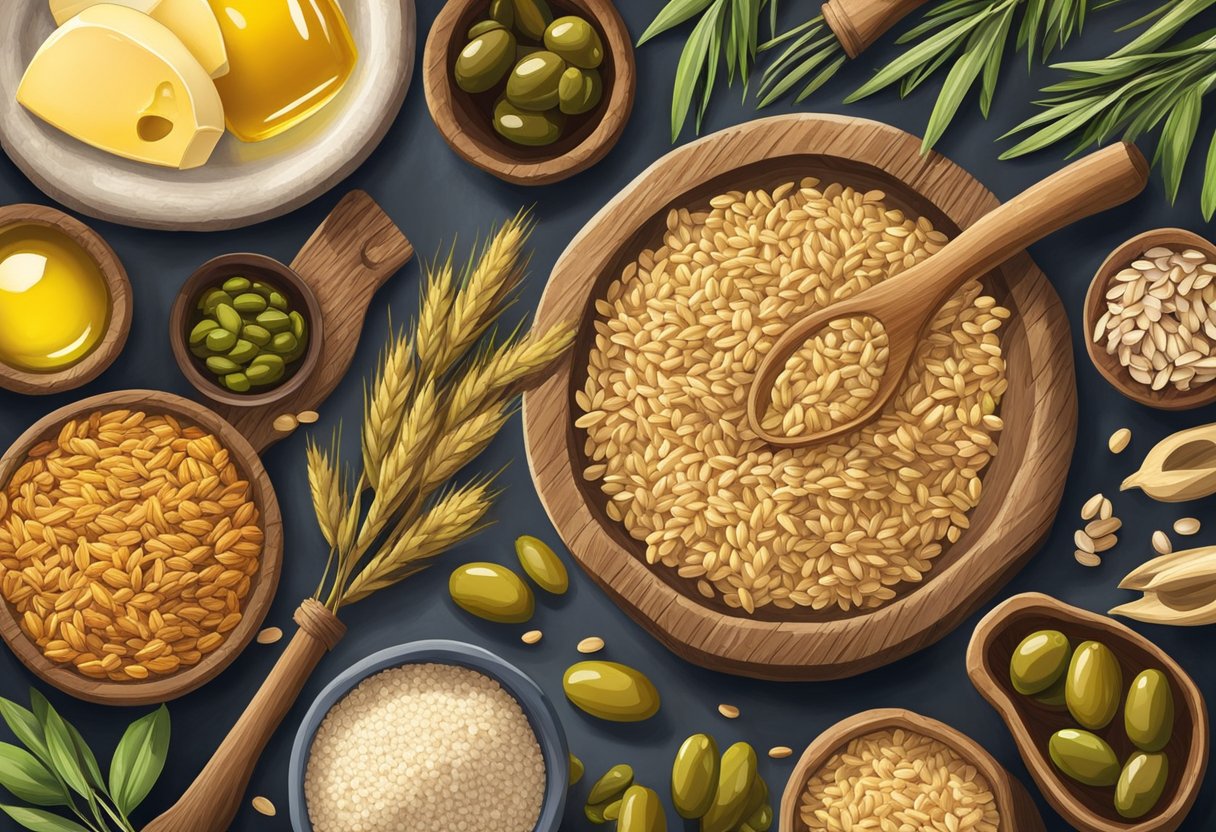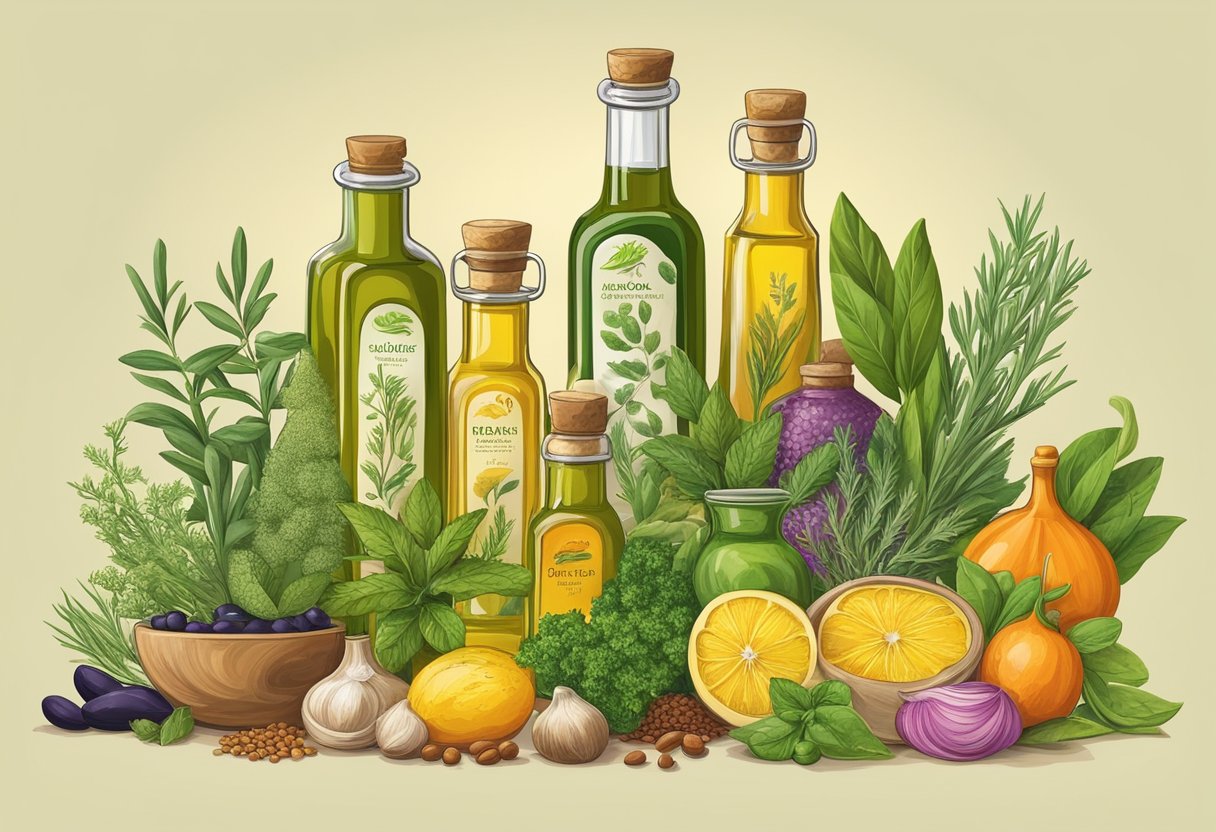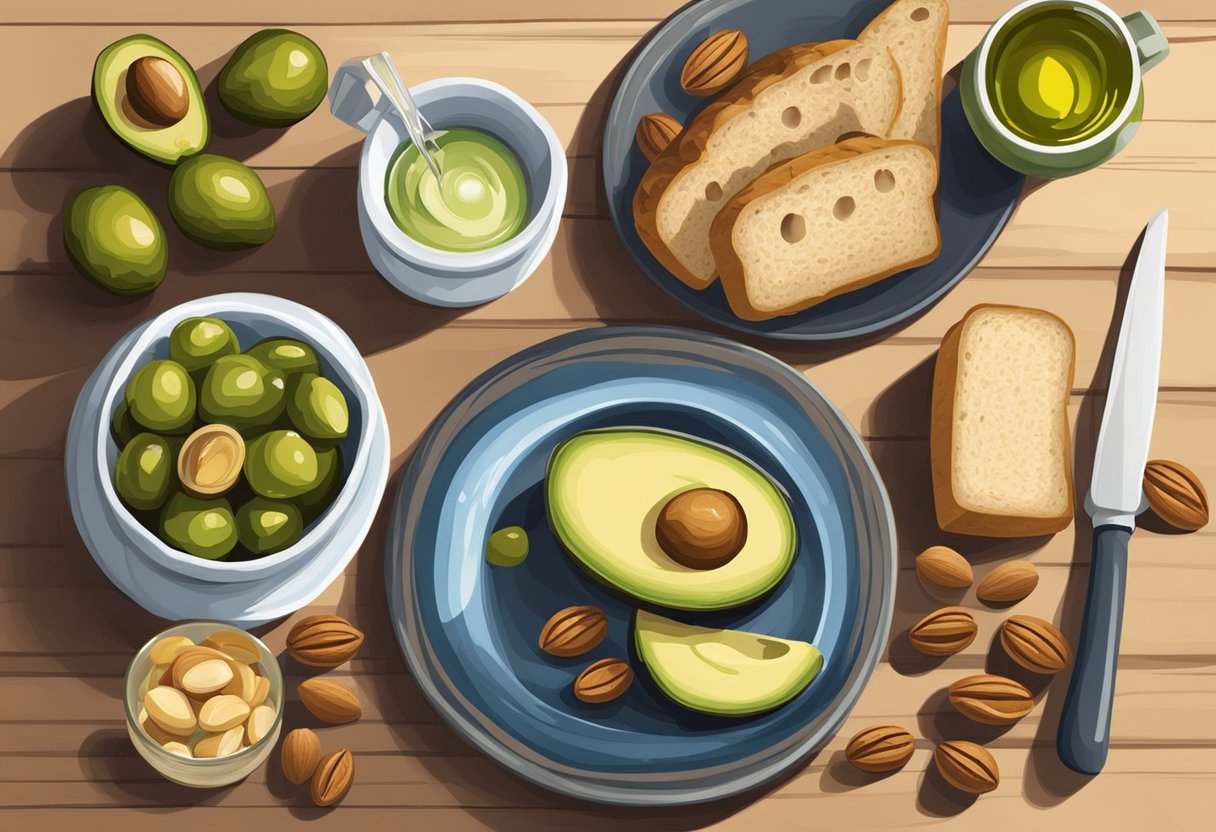Olive oil is often celebrated as the heart-healthy hero of the quintessential Mediterranean diet, revered for its monounsaturated fats and contribution to longevity and wellness. Beyond olive oil, a myriad of healthy fats play a crucial role in this diet, which is characterized by a rich variety of plant-based foods, lean proteins, and whole grains.
Striking a balance within a gluten-free framework presents an additional layer, focusing on the exclusion of wheat, barley, and rye to accommodate those with gluten sensitivities or celiac disease.

The Mediterranean diet, praised for its nutrient-dense and diverse palette, spans a tapestry of flavors and ingredients, with olive oil as a cornerstone. This eating pattern also embraces other sources of healthy fats, such as nuts, seeds, and fatty fish, melding them into a dietary symphony that supports both heart health and overall well-being.
Adopting a gluten-free Mediterranean diet doesn’t require sacrificing flavor or nutrition; it simply calls for mindful selection of gluten-free whole grains and careful preparation of meals to maintain the integrity of this ancient, health-promoting way of eating.
Key Takeaways
- Olive oil is central to the Mediterranean diet, with additional healthy fats supporting overall wellness.
- A gluten-free Mediterranean diet incorporates a variety of nutrient-rich, naturally gluten-free foods.
- Mindful meal preparation and ingredient choice are fundamental in a gluten-free Mediterranean lifestyle.
Table of Contents
Essential Components of a Mediterranean Diet

A gluten-free Mediterranean diet consists of a diverse array of nourishing foods that are naturally devoid of gluten, making it suitable for those with celiac disease or gluten sensitivity. The emphasis is on whole, minimally processed items, rich in nutrients and flavors.
Vegetables and Fruits: The foundation lies in a variety of colorful vegetables and fruits, providing antioxidants, vitamins, and fiber. These should be consumed in abundance each day for optimal health.
Whole Grains: Gluten-free whole grains like quinoa, brown rice, and buckwheat are staples, offering essential B vitamins and fiber, without compromising on dietary restrictions.
Legumes: Beans, lentils, and chickpeas are prominent sources of plant-based protein and fiber, making them a key element in the gluten-free Mediterranean diet.
Nuts and Seeds: Almonds, walnuts, flaxseeds, and chia seeds are included for their healthy fats and protein, as well as for adding crunch and flavor to dishes.
Olive Oil: Extra virgin olive oil is the primary source of fat, lauded for its heart-healthy monounsaturated fats and beneficial antioxidants.
Dairy and Eggs: Moderate consumption of dairy products such as cheese and yogurt contributes calcium and protein, while eggs serve as an additional protein source.
Fish and Poultry: These proteins take precedence over red meats and are best enjoyed grilled, baked, or sautéed with a drizzle of olive oil and herbs.
Herbs and Spices: Fresh herbs like rosemary and thyme, along with a variety of spices, are used generously to add aroma and reduce the need for added salt.
Cheese: In moderation, cheese such as feta and halloumi add flavor and calcium to the diet without gluten.
This diet encourages a luxurious array of flavors and textures while maintaining a focus on healthful, gluten-free options.
Benefits of Olive Oil in the Diet
Incorporating olive oil into one’s diet offers multiple health benefits, particularly for the heart and in reducing inflammation, due to its rich content of monounsaturated fats and antioxidants.
Monounsaturated Fats and Heart Health
Olive oil is lauded for its high content of monounsaturated fats, which are considered heart-healthy fats. These fats can help lower the risk of cardiovascular disease by improving cholesterol levels; specifically, they can increase the levels of HDL (good) cholesterol while reducing LDL (bad) cholesterol. Studies supported by institutions like the Cleveland Clinic highlight the positive impact extra virgin olive oil can have on maintaining a healthy balance of cholesterol.
Anti-Inflammatory Properties
The anti-inflammatory effects of olive oil are attributable to antioxidants such as oleocanthal, which has been shown to function similarly to ibuprofen. A diet rich in olive oil can help reduce inflammation, a key factor in the prevention and management of chronic illnesses. The polyphenols in olive oil not only provide anti-inflammatory benefits but also aid in protecting the body from oxidative stress.
Improvement of Blood Pressure
Regular consumption of olive oil may lead to an improvement in blood pressure. This effect is mediated by its ability to improve the lining of blood vessels, making them more elastic and better at accommodating blood flow. Health organizations like Healthline acknowledge olive oil’s role in the management of blood pressure, further contributing to a heart-healthy profile within a gluten-free Mediterranean diet.
Incorporating Healthy Fats Beyond Olive Oil

While olive oil is a staple in the Mediterranean diet, a variety of other sources of healthy fats play a valuable role. These alternatives complement gluten-free eating by providing essential fats without compromising flavor or nutrition.
Nuts and Seeds
Nuts and seeds are nutritional powerhouses, providing a dense source of energy and healthy fats. Almonds, for instance, are rich in monounsaturated fats, which can support heart health. A handful of raw walnuts contributes significantly to the daily intake of omega-3 fatty acids. Seeds such as flaxseeds and chia seeds also offer substantial amounts of omega-3 fats and can be easily incorporated into gluten-free meals, such as sprinkling onto salads or blending into smoothies.
Avocados and their Benefits
Avocados are another excellent source of monounsaturated fats. Just one avocado can contain around 10 grams of monounsaturated fat, contributing to a reduction in LDL (bad) cholesterol levels. They’re also packed with fiber, making them a satisfying addition to any dish. Whether mashed into guacamole or sliced over a bed of greens, avocados are a versatile component in a gluten-free Mediterranean diet.
Exploring the Role of Fish
In a gluten-free Mediterranean diet, fish is essential for its high omega-3 fatty acid content. Fatty fish like salmon and trout are among the best sources. Regular consumption of these fish can support brain health and decrease the risk of chronic diseases. It’s recommended to include fish like salmon at least twice a week to harness these benefits fully.
Understanding Gluten-Free Whole Grains

Incorporating whole grains into a gluten-free Mediterranean diet is essential for those with celiac disease or gluten sensitivity. They must avoid grains like barley but can still enjoy a variety of nutritious alternatives.
Quinoa, Buckwheat and more
Whole grains are an essential component of a balanced diet, providing not only energy but also key nutrients. For individuals on a gluten-free diet, grains such as quinoa and buckwheat serve as excellent substitutes for gluten-containing grains like barley. These alternatives are not only safe for individuals with celiac disease but also offer a diverse nutritional profile.
- Quinoa: A complete protein containing all nine essential amino acids.
- Buckwheat: Rich in antioxidants and supports heart health.
- Rice: A versatile grain that can be easily incorporated into various dishes.
- Oats: Ensure they are labeled gluten-free to avoid cross-contamination.
Benefits of Fiber
Fiber plays a crucial role in digestive health and maintaining a feeling of fullness. For those on a gluten-free diet, finding fiber sources can be challenging due to the exclusion of certain whole grains.
- Quinoa and buckwheat both have high fiber content, promoting satiety and digestive well-being.
- Consuming whole grains like gluten-free oats can help meet the daily fiber needs and provide the benefits of a full-fiber diet.
This focus on gluten-free whole grains ensures that individuals with celiac disease or gluten sensitivity can enjoy the nutritional benefits of a Mediterranean diet without the gluten.
Managing Protein Intake with Fish, Meat, and Legumes

Protein is a crucial component of a gluten-free Mediterranean diet, and balancing its intake from various sources like fish, meat, and legumes is essential. These sources provide not only the necessary proteins but also a variety of other nutrients beneficial for health.
Fish and Seafood
Fish and seafood are staples of the Mediterranean diet, offering a rich supply of omega-3 fatty acids and lean protein. For example, salmon and mackerel, choice selections due to their higher fat content, are frequently incorporated. Individuals typically consume fish at least twice a week, choosing options such as herring, sardines, or trout, which support heart health without adding gluten to the diet.
Legumes and Plant-Based Proteins
Legumes such as beans, lentils, and chickpeas are excellent plant-based proteins that suit a gluten-free Mediterranean diet well. They are versatile ingredients that can be included in salads, soups, or dips. Chickpeas, for example, are commonly used to make gluten-free hummus, while lentils provide a substantial base for hearty dishes. These legumes not only offer protein but also help in maintaining blood sugar levels due to their high fiber content.
Moderating Meat Consumption
While meat is included in the Mediterranean diet, it is consumed in moderation, particularly red meat. Poultry is more frequent, serving as a healthier source of protein, with only modest amounts of red meat consumed occasionally—typically a few times per month. Utilizing meat judiciously within a gluten-free framework, one might prioritize lean cuts and prepare them with herbs, spices, and olive oil to align with Mediterranean practices.
Fruits and Vegetables: The Cornerstone of the Diet
A gluten-free Mediterranean diet is rich in nutrients partly due to its heavy emphasis on a variety of fruits and vegetables. These whole foods not only provide essential vitamins and minerals but also serve as foundational components for myriad dishes within the diet.
Benefits of Leafy Greens and Colorful Vegetables
Leafy greens such as spinach and kale are high in fiber and low in carbohydrates, aligning with both gluten-free and Mediterranean dietary practices. They are abundant in vitamins A, C, and K, along with minerals like iron and calcium. Colorful vegetables including tomatoes, broccoli, zucchini, and eggplant, contribute different phytonutrients, each with unique health benefits. For instance, tomatoes are celebrated for their lycopene content, which is linked to reduced risk of heart disease.
Incidence of Fruits in a Balanced Diet
Fruits are a staple in the Mediterranean diet, consumed frequently throughout the day. They provide vital antioxidants and fiber, serving as natural dessert options that avoid processed sugars. Richly colored fruits like berries provide flavonoids, while citrus fruits offer a good source of vitamin C. Fruits, consumed in their whole form, complement the gluten-free lifestyle by providing sweetness and variety without the need for added gluten-containing grains.
The Role of Dairy in a Gluten-Free Mediterranean Diet
Dairy plays a supportive role in this diet, contributing to intake of calcium and protein. It’s included in moderate amounts and chosen with care to ensure it’s gluten-free.
Selecting Cheeses and Yogurts
When incorporating cheese and yogurt into a gluten-free Mediterranean diet, it is essential to select natural, unprocessed varieties. Cheeses such as feta, Parmesan, and aged cheddar typically contain less lactose and are less likely to pose a risk of gluten contamination. However, they should always verify the absence of gluten-containing additives on the label.
Yogurt, especially plain, natural, or Greek yogurt, can be a healthy addition. Yogurts with active cultures offer probiotics, which are beneficial for gut health. Individuals should look for yogurts that are marked certified gluten-free to ensure safety.
Dairy Alternatives
For those who prefer dairy alternatives or are lactose intolerant, the gluten-free Mediterranean diet accommodates a variety of options. Plant-based milks such as almond, soy, and coconut milk can be used in place of traditional dairy milk. These alternatives are often enriched with calcium and other vitamins.
Non-dairy alternatives for cheese and yogurt made from nuts or soy also fit well within the diet. They provide similar textures and flavors for those who avoid animal-derived dairy products. As with all food on a gluten-free diet, careful label reading is imperative to avoid gluten.
In choosing dairy and its substitutes, individuals optimize their calcium and protein intake while strictly adhering to a gluten-free Mediterranean lifestyle.
Herbs, Spices, and Plant-Based Flavors

Incorporating herbs and spices into a gluten-free Mediterranean diet enriches dishes without adding gluten or extra calories. A flavorful staple, garlic, is often used minced or as garlic powder, enhancing meals with its distinctive taste and potential health benefits. Garlic is known for its ability to support cardiovascular health and is a versatile ingredient in many recipes.
Oregano is another herb celebrated for its robust flavor and antioxidant properties. It is a common element in Mediterranean cuisine, dotting dishes with its sharp, slightly bitter taste. Both fresh and dried forms of oregano can be utilized to season a variety of meals, from salads to grilled vegetables.
Herbs and spices not only contribute rich flavors to foods but also contain various health-promoting compounds. Aromatic substances like basil, rosemary, and thyme add complexity to plant-based recipes while supporting overall well-being.
The use of these plant-based flavors is integral to the character of Mediterranean cuisine and allows those on a gluten-free diet to enjoy a breadth of flavors without compromising their dietary restrictions. Here is a quick reference for some key ingredients and their common uses:
- Basil: Fresh salads, soups, and tomato-based dishes.
- Rosemary: Roasted vegetables, meats, and bread replacements.
- Thyme: Soups, stews, and bean-based dishes.
By embracing these herbs and spices, individuals can create satisfying, healthful, and naturally gluten-free meals that reflect the richness of the Mediterranean palate.
Balancing Carbohydrates: Sourcing Healthy Options
In a gluten-free Mediterranean diet, it is essential to focus on whole grains and complex carbohydrates as they provide sustained energy and essential nutrients. Choosing the right kind of carbohydrates is crucial for maintaining a balanced diet.
Choosing Complex Carbs Over Refined
Individuals following a gluten-free Mediterranean diet should opt for whole grains such as quinoa, millet, and brown rice over processed grains. These intact grains contribute to a feeling of fullness without the gluten found in traditional wheat products. Furthermore, starchy vegetables like sweet potatoes and corn serve as excellent sources of vitamins, minerals, and fiber, promoting digestive health and offering a wealth of nutritional benefits.
- Quinoa: A complete protein containing all nine essential amino acids.
- Brown Rice: A gluten-free grain that provides manganese, selenium, and essential fibers.
The Impact of Sugars and Sweets
A Mediterranean diet limits the intake of sweets and added sugars due to their minimal nutritional value and rapid impact on blood sugar levels. When desiring something sweet, individuals should consider fruit as a natural substitute that also offers vitamins and antioxidants. It is important to recognize that sugar can be hidden in many products, emphasizing the need for vigilance in checking ingredients. Consuming whole fruits and natural sweeteners in moderation can help maintain the diet’s integrity.
- Fruits: Use as a natural sweet alternative to processed sugars.
- Natural Sweeteners: Occasionally can be used, but always in moderation.
Optimizing Nutrition for Specific Health Conditions

The gluten-free Mediterranean diet offers numerous health benefits, particularly for managing and preventing chronic diseases. Rich in healthy fats such as olive oil, this approach focuses on whole foods that support heart health, blood sugar control, and cancer prevention.
Heart Disease and Cholesterol Management
Individuals with heart disease can benefit from a diet high in monounsaturated fats and omega-3 fatty acids, which are known for their heart-healthy benefits. In particular, olive oil, a staple of the Mediterranean diet, is associated with lower levels of bad cholesterol (LDL) and higher levels of good cholesterol (HDL). A gluten-free Mediterranean diet emphasizes olive oil consumption and other anti-inflammatory foods that can help manage cholesterol and reduce cardiovascular risk.
- Foods to Include: Olive oil, fatty fish like salmon, flaxseeds, chia seeds.
- Foods to Avoid: High-fat dairy, processed meats, foods with trans fats.
Addressing Diabetes with a Mediterranean Approach
For individuals managing type 2 diabetes, a gluten-free Mediterranean diet can be beneficial. The diet’s high fiber content from fruits, vegetables, and nuts can help regulate blood sugar levels. The inclusion of olive oil may also help reduce inflammation, an important factor in diabetes management. Foods in this dietary pattern are low on the glycemic index, which is crucial for stabilizing blood glucose.
- Foods to Include: Leafy greens, whole grains like quinoa and brown rice, legumes.
- Foods to Avoid: Sugary snacks, refined grains, high-glycemic fruits.
Cancer Prevention Through Diet
A diet rich in antioxidants and phytochemicals, which are abundant in a gluten-free Mediterranean diet, may contribute to cancer prevention. Foods such as fruits, vegetables, nuts, and particularly olive oil, are linked to a reduced risk of some cancers. These foods help neutralize free radicals and may lower the risk of chronic inflammation, a contributing factor in cancer development.
- Foods to Include: Berries, cruciferous vegetables like broccoli, nuts, seeds.
- Foods to Avoid: Processed meats, excessive alcohol, high-sugar foods.
Lifestyle and Dietary Tips for Long-Term Health

Adopting a Mediterranean diet, especially when it’s gluten-free, can offer extensive health benefits. The focus on heart health and weight management is particularly beneficial for preventing obesity and maintaining overall wellness.
Effective Weight Loss Strategies
The Mediterranean diet emphasizes the consumption of healthy fats, such as those found in olive oil, which has been linked to a lower risk of dying during a 28-year study period. A dietitian can tailor this diet to align with gluten-free requirements, ensuring that one receives all necessary nutrients without compromising digestive health. Weight loss is more sustainable when it involves:
- Whole foods: vegetables, fruits, nuts, and legumes
- Healthy fats: focus on olive oil and other beneficial oils like those suggested here
- Lean proteins: fish and poultry
- Regular meals with portion control
Because olive oil can safely be included in a gluten-free diet, individuals can leverage its health benefits while avoiding gluten-containing grains.
Exercise and Physical Activity
Physical activity complements the Mediterranean diet for heart health and weight management. They should include regular exercise, which a registered dietitian often recommends as part of a comprehensive health plan. Regular exercise helps in:
- Reducing the risk of obesity
- Improving cardiovascular strength
- Enhancing weight loss efforts
Daily routines can incorporate a variety of activities, such as walking, swimming, or cycling, to maintain motivation and interest. Physical activity, along with a balanced, gluten-free Mediterranean diet, paves the way for long-term health maintenance.
Cultural Influences and Traditional Foods

The Mediterranean diet, deeply rooted in the cultures bordering the Mediterranean Sea, is renowned for its health benefits. Countries like Greece and Italy have long celebrated the use of olive oil, a cornerstone of this diet, which is essential in crafting a gluten-free version of the cuisine.
In Greece, olive trees are symbols of resilience and renewal. The use of olive oil is not just a dietary choice but a reflection of Greek history and tradition. Traditional Greek dishes often combine olive oil with fruits, vegetables, and grains that are naturally gluten-free, such as rice and corn.
Italy also has a rich culinary history that emphasizes fresh, local ingredients. Italians have perfected the art of cooking with olive oil, which enhances the flavor of gluten-free pasta made from rice or corn flour.
Table of Ingredients Common in a Gluten-Free Mediterranean Diet
| Ingredient | Role in Diet | Cultural Significance |
|---|---|---|
| Olive Oil | Healthy fat source | Integral to Greek and Italian cuisine |
| Fruits & Vegetables | Main dish components | Emphasizes seasonal, local produce |
| Legumes & Nuts | Protein sources | Used in traditional dishes across the Mediterranean |
| Fish & Seafood | Protein and omega-3 fats | Abundant due to proximity to the sea |
The diet encourages a bounty of plant-based foods, modest portions of protein from legumes, nuts, fish, and seafood, with minimal reliance on gluten-containing grains. This aligns with the cultural practices of these regions, where meals are a celebration of community, using ingredients that are as wholesome as they are flavorful.
Navigating Alcohol Consumption

In a gluten-free Mediterranean diet, responsible intake of certain alcoholic beverages can be incorporated. Attention to both choice and quantity ensures alignment with dietary goals.
Red Wine in Moderation
Moderate consumption of red wine is often considered a component of the Mediterranean diet. Specifically, red wine contains antioxidants like resveratrol and flavonoids which may offer cardiovascular benefits. The key is moderation, which is generally defined as:
- Men: Up to two 5-ounce servings per day
- Women: One 5-ounce serving per day
It’s important for individuals to consult with healthcare providers about personal health and risks associated with alcohol.
When selecting a red wine, one should look for options that are:
- Dry varieties: Typically lower in sugar
- Traditionally produced: To avoid potential gluten contamination in the fining process
One should always check labels, as some wines might not be gluten-free due to the barrel aging process where wheat-based pastes can be used to seal barrels.
Smart Choices for Fats and Sweets
Making smart choices for fats involves selecting heart-healthy unsaturated fats while limiting saturated fats. For those with a sweet tooth, it’s possible to enjoy desserts by opting for alternatives that align with a gluten-free Mediterranean diet.
Understanding Unsaturated versus Saturated Fats
Unsaturated fats are typically liquid at room temperature and can be found in olive oil, which is a staple of the Mediterranean diet. They are categorized into monounsaturated fats and polyunsaturated fats, both of which can support heart health. Monounsaturated fats, in particular, are present in olive oil and avocado oil, offering a heart-healthy alternative to saturated fats, which are solid at room temperature and are found in higher quantities in animal products and certain oils.
Table 1: Common Sources of Fats in a Gluten-Free Mediterranean Diet
| Type of Fat | Sources |
|---|---|
| Monounsaturated Fats | Olive Oil, Avocado Oil, Nuts |
| Polyunsaturated Fats | Fish, Flaxseeds, Walnuts |
| Saturated Fats | Red Meat, Dairy Products, Palm Oil |
Those embarking on a gluten-free Mediterranean diet should aim to substitute saturated fats with unsaturated fats to maintain this balance.
Healthful Approaches to Desserts
In a gluten-free Mediterranean diet, they can indulge in desserts that harness the natural sweetness of fruits without heavy reliance on added sugars. Desserts should be viewed as a treat rather than an everyday occurrence. One can use fruits like figs, dates, and apricots, which are in line with Mediterranean selections, to sweeten dishes naturally. It is also beneficial to incorporate healthy fats, like those found in nuts, into desserts for added nutritional value.
- Recipe Suggestion: Almond flour cakes with lemon zest and a drizzle of honey offer a satisfying end to a meal while staying true to the principles of healthy fats and gluten-free living.
By focusing on unsaturated fats and natural, fruit-based sweets, individuals can enjoy the rich flavors of the Mediterranean diet while aligning with their dietary needs.
Adopting a Mediterranean Diet for Longevity
The Mediterranean diet is distinguished by its emphasis on fruits, vegetables, whole grains, legumes, and healthy fats, predominantly from sources like olive oil. It’s often associated with enduring health and improved lifespan. For individuals who are gluten-free, this diet can still be accessible by choosing gluten-free whole grains.
Longevity and the Mediterranean Diet:
Studies indicate that this diet may contribute to longer life expectancy. A key factor is the high intake of healthy fats, such as those found in olive oil, which have been linked to a decreased risk of chronic diseases.
Key Components of a Gluten-Free Mediterranean Diet:
- Healthy Fats: Olive oil is central to the diet, as it is linked to reduced risk of mortality and may even add years to one’s life.
- Fruits and Vegetables: These are the cornerstone for a nutrient-rich, gluten-free Mediterranean diet.
- Proteins: Almost exclusively from fish, legumes, and plant-based sources.
- Whole Grains: Gluten-free options include quinoa, buckwheat, and millet.
By adopting this diet, individuals may enjoy a variety of health benefits that contribute to longevity. Ensuring the diet remains gluten-free involves careful selection of whole grains and awareness of gluten-containing ingredients.
Gluten-Free Grains in a Mediterranean Diet
| Whole Grain | Gluten-Free | Nutrient Profile |
|---|---|---|
| Quinoa | Yes | Complete protein, fiber |
| Buckwheat | Yes | High in antioxidants |
| Millet | Yes | Rich in B vitamins |
In essence, the Mediterranean diet’s high concentration of antioxidants, healthy fats, and fiber can play a crucial role in promoting longevity. Adopting this diet may offer a valuable strategy for enhancing overall health and lifespan while catering to gluten-free needs.
Considerations for Sustainability and Local Foods

Integrating extra virgin olive oil into a gluten-free Mediterranean diet supports both health and sustainability. This pairing leverages the natural benefits of plant-based foods, while emphasizing the importance of local sourcing. Extra virgin olive oil, known for its nutritional value, plays a crucial role in the Mediterranean diet, offering a source of healthy fats essential for well-being.
When adopting a gluten-free Mediterranean diet, one should focus on the consumption of local foods. It reduces the carbon footprint associated with transportation, supporting environmental sustainability. By choosing local and seasonal produce, individuals can enjoy fresher ingredients that retain more nutrients.
Plant-based foods form the cornerstone of the Mediterranean diet. They are naturally gluten-free and provide a rich array of vitamins and minerals. Sustainable agricultural practices in growing these crops ensure the longevity of farming and the health of the ecosystem.
Sustainability in the context of the Mediterranean diet extends beyond just the environmental aspect. It includes social and economic considerations as well, such as fair trade and supporting local economies. Incorporating local olive oils, legumes, fruits, and vegetables into one’s diet can strengthen community bonds and ensure that economic benefits are felt within the region.
In conclusion, a gluten-free Mediterranean diet that incorporates extra virgin olive oil and other plant-based foods, while focusing on local sourcing, is beneficial for both personal health and the environment. It is a lifestyle choice that respects the reciprocal relationship between humans and the natural world.
Hydration and Beverage Choices

Incorporating healthy beverage choices is crucial for a balanced gluten-free Mediterranean diet. Hydration is fundamental, and the preferred beverage is water. Water remains the ideal choice for hydration, without the addition of calories or gluten. It is recommended that individuals consume sufficient water daily to support the body’s needs.
When considering flavored beverages within this diet, tea emerges as a prominent option. Tea, particularly green and herbal varieties, can be enjoyed without gluten-containing additives and offers a range of potential health benefits. The antioxidants present in tea may contribute to heart health and can align with the principles of the Mediterranean dietary pattern.
The table below outlines hydration and beverage choices suitable for a gluten-free Mediterranean diet:
| Beverage Type | Benefits | Notes |
|---|---|---|
| Water | Calorie-free, Hydrates | Always available and perfect for all meals |
| Tea | Antioxidants, Heart Health | Choose plain teas without added barley or gluten-containing ingredients |
It’s important to note that individuals should read labels carefully to ensure their teas are free from gluten-containing grains. Some processed beverages may include additives derived from barley, which is not suitable for those on a gluten-free regimen.
Users are also encouraged to indulge in beverages such as fruit-infused water or naturally-flavored seltzers which can provide variety while maintaining adherence to the diet’s guidelines. Avoid sugary soft drinks and high-calorie beverages which do not offer the health benefits consistent with the Mediterranean lifestyle.
Remember, the focus should be on natural, simple ingredients that contribute to hydration and provide health benefits while aligning with a gluten-free Mediterranean diet.
Meal Planning and Preparation

When embarking on a gluten-free Mediterranean diet, meal planning becomes an essential tool for maintaining a balanced and nutritious diet. Meal planning involves selecting a variety of naturally gluten-free foods that are staples in the Mediterranean diet, such as fruits, vegetables, nuts, seeds, and healthy fats like olive oil. Preparation methods should focus on preserving nutrient density while maximizing flavor.
Creating a Weekly Meal Plan:
- Monday: Grilled fish with a side of quinoa salad mixed with vegetables and drizzled with olive oil.
- Tuesday: Stuffed bell peppers with a filling of lean ground turkey, spinach, and gluten-free grains.
- Wednesday: Eggplant and chickpea stew seasoned with herbs and spices, perfect for a wholesome dinner.
- Thursday: Baked chicken with a side of roasted root vegetables and a sprinkle of herbs.
- Friday: Pan-seared salmon topped with a lemon and caper sauce, accompanied by a fresh garden salad.
- Saturday: Lentil soup made with a variety of vegetables and served with gluten-free bread.
- Sunday: A vibrant tabbouleh made with gluten-free couscous and a variety of chopped fresh vegetables.
Tips for Meal Prep:
- Wash and chop vegetables ahead of time for quick assembly.
- Cook larger batches of gluten-free grains such as quinoa or rice to use throughout the week.
- Portion out snacks such as nuts and seeds in small containers for convenience.
- Have a variety of spices on hand to enhance the flavor of dishes without adding gluten.
Utilizing these methods supports individuals in adhering to this heart-healthy diet by minimizing the risk of accidental gluten consumption and ensuring that meals are satisfying and enjoyable.
Shopping and Storing Foods

When shopping for a gluten-free Mediterranean diet, individuals should focus on purchasing high-quality, unprocessed foods. Key staples include fresh produce, lean proteins—especially fish—legumes, nuts, seeds, and of course, healthy fats such as extra virgin olive oil.
Shopping List:
- Fresh vegetables (leafy greens, tomatoes, cucumbers)
- Fresh fruits (citrus, berries, melons)
- Lean proteins (fish, poultry)
- Legumes (beans, lentils)
- Nuts and seeds (almonds, chia seeds)
- Extra virgin olive oil
- Herbs and spices (basil, oregano)
For those incorporating oils beyond olive oil, it’s prudent to select oils with similar health benefits, like avocado oil or almond oil. Choosing extra virgin olive oil ensures obtaining the most antioxidants and polyphenols, as this oil is least processed.
Storing Tips for Oils:
- Keep oils in a cool, dark place.
- Tighten caps to prevent oxidation.
- Use oils within the
best before date.
Storing nuts and seeds can also be approached with care to maintain their freshness. Refrigerating or freezing these items in airtight containers can extend their shelf life. Fresh produce should be stored in the refrigerator’s crisper drawer, and fish should be consumed within a day or two of purchase or stored in the freezer.
Intelligent shopping and proper storage are essential in maintaining the integrity of the foods within a gluten-free Mediterranean diet. This attention to detail ensures that the nutritional quality of the meals is preserved, leading to a more successful health and dietary experience.
Eating Out and Social Aspects of the Mediterranean Diet

When individuals following a gluten-free Mediterranean diet choose to eat out, they can still enjoy the social and culinary delights that this lifestyle offers. Restaurants often cater to the needs of patrons seeking healthy fats, such as those found in olive oil, and gluten-free options.
Tips for Dining Out:
- Look for Menu Items such as grilled fish, salads dressed with olive oil and lemon, and vegetable-centric dishes.
- Ask About Preparation: Chefs can typically modify dishes to be gluten-free upon request.
- Selecting Sides: Opt for sides like roasted potatoes or steamed vegetables that naturally align with a Mediterranean diet.
The Mediterranean diet emphasizes communal meals and sharing dishes. People can engage in social dining by ordering a variety of compatible dishes for the table.
| Social Eating Tips | Description |
|---|---|
| Share Small Plates | Tapas or meze, small plates of food, are perfect for sampling different flavors and maintaining a balanced diet. |
| Family-Style Meals | Large platters of main courses like grilled seafood or roasted vegetables encourage communal eating and portion control. |
Eating out needn’t be a solo endeavor. Friends and family often appreciate the heart-healthy, flavorful options of a Mediterranean meal.
Finding Restaurants:
- Mediterranean and Middle Eastern restaurants naturally cater to the diet.
- Other cuisines may offer adaptable dishes, so calling ahead can be beneficial.
In summary, a gluten-free Mediterranean diet can be social and satisfying even when eating out, with a little forethought and flexibility.
Frequently Asked Questions
The following questions address specific concerns about incorporating healthy fats into a gluten-free Mediterranean diet, focusing on practical substitutions and applications of olive oil.
What substitutes should I use for common gluten-containing foods when following a gluten-free Mediterranean diet?
Individuals should opt for naturally gluten-free grains such as quinoa, brown rice, and buckwheat. These grains maintain the integrity of the Mediterranean diet’s focus on whole foods. For more guidance, see the Celiac Disease Foundation’s 7-Day Gluten-Free Mediterranean Diet Meal Plan.
What are some top sources of healthy fats to include in a gluten-free Mediterranean diet?
Healthy fats can be sourced from olive oil, nuts, seeds, and avocado oil. These fats are integral to the diet’s balance, providing essential fatty acids and flavor. More about healthy oil choices can be found at EatingWell’s discussion of healthy oils.
How can I incorporate olive oil into my daily meals while following a Mediterranean diet plan?
Olive oil can be used for salad dressings, drizzled over cooked vegetables, or as a healthy substitute for butter when sautéing. Its versatility makes it easy to integrate into multiple meal types within the dietary plan.
What is a practical gluten-free Mediterranean diet shopping list that includes healthy fats?
A shopping list should include items like extra-virgin olive oil, avocados, nuts such as almonds and walnuts, and seeds like flaxseed and chia. It should also feature fatty fish like salmon, known for their omega-3 content.
Can you provide some gluten-free Mediterranean diet recipes that focus on healthy fats like olive oil?
Recipes might include grilled fish with a drizzle of olive oil and herbs, mixed nuts for snacking, or a quinoa salad tossed with olive oil and lemon juice. For specific Mediterranean-style gluten-free meal ideas, explore this detailed plan at Health Canal.
What is the recommended amount of olive oil to consume daily within a gluten-free Mediterranean diet?
Health experts often suggest around 1-4 tablespoons of olive oil per day as part of a healthy diet. This aligns with the traditional consumption patterns of Mediterranean populations.



